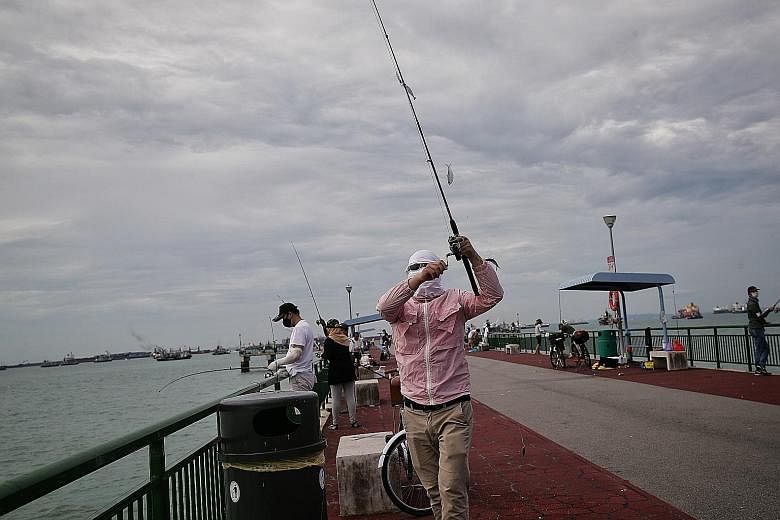With travel off the cards, anglers here are casting their lines into local waters more often, raising concerns over whether marine creatures might be fished out faster than they can reproduce.
Some members of the fishing community have proposed a solution. Working with conservationists and marine scientists, the Marine Stewards non-profit group has come up with three guidelines for fishermen.
First, juvenile fish should be released, so that they may repopulate the sea. A list of maturity lengths for species commonly found in Singapore waters, such as the orange-spotted grouper, is provided on the group's website.
Second, the critically endangered shovelnose ray - commonly served as "shark head" in restaurants - should not be taken at all.
Third, anglers should keep hybrid groupers that are caught, Marine Stewards recommends, as these are non-native species that could out-compete native fish for food, disrupting the local ecosystem.
"For fishermen, sustainable fishing will allow the sport to flourish and even improve in generations to come," said Ms Sue Ye, founder of Marine Stewards.
Ms Ye herself is from the fishing community.
Her company, Singapore Fishing Charter, has seen a 30 per cent increase in monthly bookings for fishing charters since mid-June, when Singapore reopened its economy after a two-month circuit breaker period to stem the spread of Covid-19.
Recreational travel is still not permitted.
"With the increased fishing pressure, the company is committed to ensuring sustainable fishing practices on board," said Ms Ye.
Mr Conrad Lee, 47, a teacher who fishes for recreation, said that getting people to release juvenile fish with the right technique would be a good first step in inculcating sustainable fishing guidelines in the community. "But we should not impose our will over others who might need fish for food," he added.
National University of Singapore fish scientist Zeehan Jaafar, who worked with Marine Stewards on the guidelines, said the effort was a good first pass at garnering stakeholder buy-in in the absence of legislation.
But a catch-and-release programme would have to be more comprehensive, she said, citing how recreational anglers are allowed to take species of any size.
Last month, for instance, an 80kg honeycomb whipray - a species vulnerable to extinction - was caught off Bedok Jetty.
Dr Jaafar said there was also conservation value in releasing mature fish. "The high reproductive potential of larger individuals is a major factor in ensuring healthy fishery stock," she said.
Mr Stephen Beng, chair of the Friends of Marine Park community, said that because there are no large-scale fisheries operating in Singapore waters, recreational fishing could have an impact on fish stock here.
"We need to be aware of the potential issues caused by mismanaged recreational fishing... It makes more sense therefore for those who do recreational and sport fishing to be involved in the conservation of our reef and aquatic habitats," said Mr Beng, adding that a balance must be struck between passion for fishing and sustainability.
The Friends of Marine Park community, which comprises stakeholders such as anglers, boat owners, academics and government agencies, is working on outreach and education programmes, especially for those new to the activities, be it fishing, boating or diving.
Dr Jeffrey Low, senior manager at the coastal and marine division at the National Parks Board's National Biodiversity Centre, said there are several "no-take" zones here.
Fishing is not allowed in the Sisters' Islands Marine Park, Sungei Buloh Wetland Reserve, Labrador Nature Reserve rocky shore, Chek Jawa Wetlands, and the waters around Coney Island Park.
"These areas are managed as sanctuaries for the mangrove and marine habitats to flourish and the fish population to grow to maturity," said Dr Low.
• For more information on the fishing guidelines, visit this website

